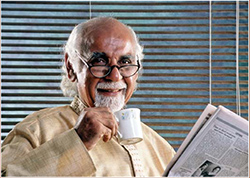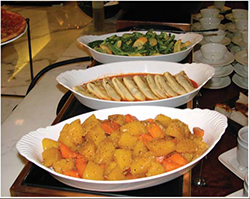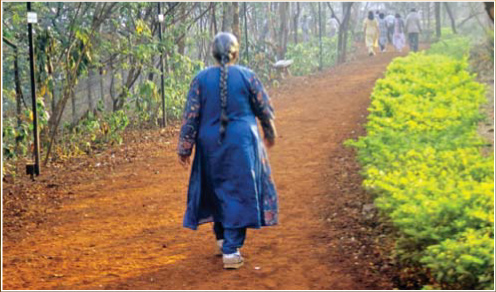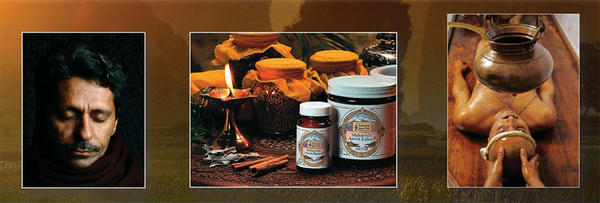
Tips for Longevity§
BY KARUNAKAR SHUKLA§
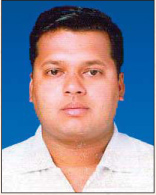
K.SHUKLA§
Ayurvedic Medicine has delineated rasayana, rejuvenation and virility, as a branch of medicine where the main purpose is to maintain health as age advances, and to keep the body healthy, avoiding the transfer of disease to our offspring. Let’s face it, we all age, but we don’t need a life style of diseases like diabetes, heart diseases, hypertension, auto-immune diseases, obesity, and cancer etc. We can all age gracefully without these horrible diseases.§
Dinacharya, Daily Routine§
1. Wake up early, before sunrise. The sun activates the pineal gland to send messages to the pituitary gland, which in turn massages the adrenal glands to release adrenal cortisol, which wakes us up from deep sleep.§
2. Drink 1-3 glasses of warm water. This helps the peristalsis to begin and helps bowel evacuation.§
3. Oral hygiene is of utmost importance for healthy gums, digestive health and healthy heart.§
4. Get in touch with your senses by massaging your body with oil customized for your body type (or sesame as a default oil). To sharpen your sense of smell, put few drops in your nose, for eyes wash your eyes with water. Similarly, put a couple drops of olive oil or vegetable glycerine in your ear, you can also dip the Q-tip in olive oil and lubricate your ears.§
5. Walk for 30 to 45 minutes, depending upon your schedule, and meditate regularly.§
6. Eat a healthy breakfast according to your constitution.§
7. Fried, processed and artificially sweetened foods, white sugar and white flour should be avoided at all times as they weaken digestion and deplete the body’s nutrition. §
8. Finish your day by mediating, exercising pranayama (breathing exercises) and quieting your mind.§
Ritucharya, Seasonal Routine§
Use a common sense approach to seasons. During the summer, dress light, eat fruits and vegetables and drink lots of fluids to prevent dehydration. During winter, dress warm; keep your vital organs, like heart and lungs, warm. Add more nuts and seeds to get extra oils and energy for winter, and lubricate your skin with oils or cold creams. In spring dress not too light or heavy. It is the seasons for allergies, so avoid mucous-producing foods like excessive sugar, dairy products, fried and heavy foods. Also, fasting on vegetables, fruits and rice proteins can be very helpful. The autumn season is considered best for cleansing.§
Pancha Karma§
Over time, we accumulate toxic materials in our bodies that lead to diseases. We may eat healthy, do our yoga, exercises and meditation, but mind may play a bigger role in a disease process. This is why pancha karma is advised. These treatments mimic the body’s natural ways of detoxification. It has been divided into three phases: purva karma, preparation for detoxification. Next is pancha karma, which involves five methods of cleansing, followed by pashchtya karma (post pancha karma) to help restore the function of the body to its natural state with rejuvenating ayurvedic herbs called rasayanas.§
The Science of Rasayana§
BY DR. M.V. SUBRAMANYAM§
One among the eight branches of ayurveda is rasayana [rejuvenation, literally, “augmentation of rasa,” the vital fluid produced by the digestion of food]. It roots out morbidity and destructive diseases, checks disease processes, corrects the various body channels, restores nourishing and promotes health. Rasayana not only alleviates or cures diseases but also maintains the intactness of body components and enhances life expectancy. It provides optimum quality of the bodily tissues thus increasing mental and physical health, thus enabling one to live for a longer period of youthfulness.§
Chyavanprash§
BY TRIPTI SHARMA§
For centuries, the ayurvedic herbal formula chyavanprash has been hailed as the ultimate anti-aging tonic. Long before there were vitamins, minerals and antioxidant supplements, there was chyavanprash, one of ayurveda’s most respected anti-aging foods. Chyavanprash is in the ayurvedic category of rasayana, or rejuvenation. It is a super-concentrated mixture of vitamin-rich herbs and minerals designed to restore spent reserves of vital energy (ojas) and revitalize normal body functions. For centuries, it has been used to maintain youth and optimal health; its adaptogenic properties make it an excellent anti-aging and anti-stress tonic.§
Abhyanga, Oil Massage§
DR. JAYASHREE NATARAJ§

J. NATARAJ§
Ayurveda envisages the benefits of abhyanga, oil massage, and recommends it as an important component of dinacharya—the daily regimen one has to follow in order to be healthy. Abhyanga improves the complexion; makes the skin glow and prevents dry and rough skin; promotes better skin texture; pacifies skin affections; improves blood circulation; improves strength and stamina; enhances muscle strength and bulk; improves the nervous system, thereby preventing nervous disorders; improves digestion; relieves constipation; and prevents aging.§
Abhyanga Procedure§
1. Use warm oil: olive oil, coconut oil, sesame oil or medicated oil required for the specific purpose.§
2. Apply oil gently all over the body, massaging in the direction of hair follicles.§
3. While massaging the whole palm should be used.§
4. The place of massage should be warm, without cold breeze.§
5. Every day abhyanga to the scalp and the soles of the feet is mandatory. This will take care of the whole body even when the whole body is not massaged with oil.§
6. The pressure exerted during oil massage should be just sufficient to produce warmth and should not be too vigorous.§
7. Wait for at least 10 to 15 minutes, then take bath. A warm water bath is a must after the massage. This will improve circulation, enhance the absorption of the oil, prevent closure of the skin pores, and keep dust from accumulating on the skin which can be a cause of skin afflictions. Mild soap (vegetarian) is preferred, and if possible, the Bengal gram powder can be used as a good skin conditioner.§
